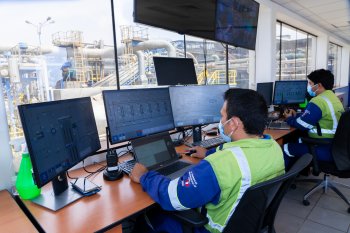The MEL system is designed to illustrate the actions MarinTrust take in order to realise the Statement of Change, to “Improve the global responsibility of the sourcing (incl. fisheries) and production of marine ingredients”. The MEL consists of a Theory of Change,associated assumptions and MEL Plan, all of which are explained in detail in the outline document found in the downloads section. The MEL outline document aims to provide stakeholders and other interested parties with a clear description of what the MEL system is and what the MEL system entails.
Benefits:
- ISEAL membership - Access to ISEAL community, funding, technical support and peer-learning
- Demonstrate the Impacts MarinTrust is having on the Marine Ingredient industry
- Learn and adapt accordingly to ensure desired Impacts are achieved

Objectives:
- Transparency – Demonstrate credibility and transparency to stakeholders and interested parties, including;
- Ensuring ongoing compliance with ISEAL’s Code.
- Enhancing MarinTrust’s credibility as the leading responsible Marine Ingredient Standard
- Increasing transparency of the success of schemes approach and impacts
- Engagement – To seek engagement from stakeholders and other interested parties.
- Performance – To track performance of MEL and impact activities.
- Improvement – To facilitate development and improvement for particular indicators of concern.
- Communication – To communicate the findings of the data collection, analysis and evaluations.
Scope:
The scope of the MEL system has been defined as follows;
- Activities outlined in the Theory of Change (ie, Outputs/Inputs)
- Assumptions that have been identified in association within the Theory of Change
- Potential negative and unintended effects in association with the Theory of Change
- The Outcomes identified within the Theory of Change
- The Impacts identified within the Theory of Change
- As the geographic scope of the MarinTrust programme, the scope of the MEL system is also defined as global
- Time boundaries for activities are aligned with those of MarinTrust resources available
- Performance monitoring though Outcome and Impact evaluations
Potential unintended effects:
- Small-scale or less-developed producers disadvantaged
- Innovation suppressed for CB’s and/or certificate holders
- Increased cost associated with certification leads to reduction in employment
- Increased efficiency associated with certification leads to reduction in employment
- Increased efficiency associated with certification leads to staff retention/ expansion of the business.
- Oversupply of certified marine ingredients leads to loss of business by certified producers
- Increasing the accessibility for some leads to a decrease in accessibility or credibility for others
- The MarinTrust standard leads to a more efficient use of energy and/or water and therefore can create more efficiencies in production and reduce waste.
- Production facilities attract new potential investment (other than product purchased or price differential) due to the reduced risk associated with MarinTrust certification.
Annual reporting on the MEL system is carried out in order to identify improvements and areas that additional work is needed. The Baseline report can be found in the download section of this page and the subsequent reports may be requested by contacting the MarinTrust Secretariat. A summary of the results of these reports can be found in the MarinTrust Annual reports here.
For any further information in relation to the MarinTrust MEL system please contact the Impacts Manager who is the principal person responsible for the MEL system at [email protected] or [email protected].
Procedures and opportunities for stakeholder engagement in the design and revision of the MEL system can be found here.
